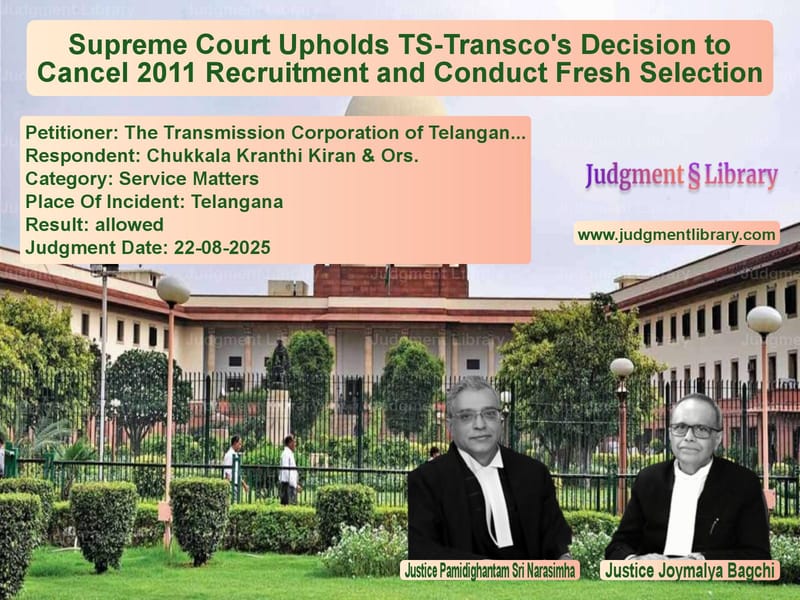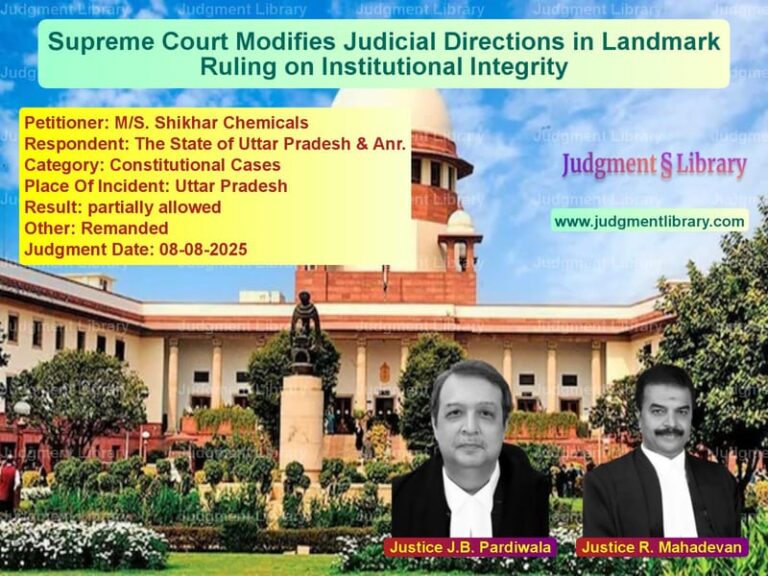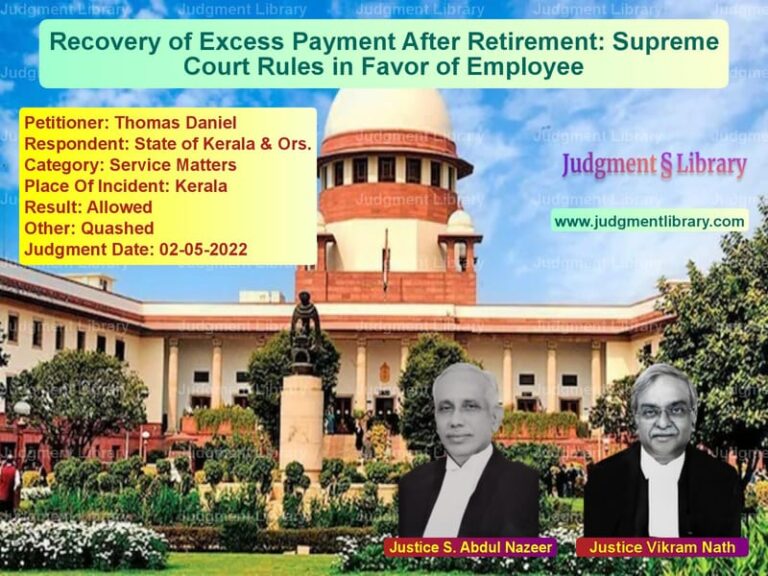Supreme Court Upholds TS-Transco’s Decision to Cancel 2011 Recruitment and Conduct Fresh Selection
In a significant judgment that clarifies the rights of selected candidates versus the discretion of employers in recruitment matters, the Supreme Court of India has overturned the Telangana High Court’s decision and upheld the Transmission Corporation of Telangana State Limited’s (TS-Transco) authority to cancel a decade-old recruitment process and initiate fresh selection. The case, which involved the complex interplay between candidates’ legitimate expectations and an employer’s right to reassess recruitment needs, particularly in the context of state bifurcation, provides important insights into the boundaries of judicial review in service matters. The judgment delivered on August 22, 2025, reinforces that while candidates may have legitimate expectations, these cannot override an employer’s bona fide decision to cancel a selection process due to changed circumstances.
The Background of the Recruitment Controversy
The dispute has its origins in 2011-2012 when the erstwhile Transmission Corporation of Andhra Pradesh Limited (AP-Transco) issued notifications for recruiting 339 Sub-Engineers across six zones in the composite State of Andhra Pradesh. The selection process faced immediate legal challenges when open category candidates contested the weightage system that allocated 45 marks out of 100 to in-service (contractual) candidates. The Telangana High Court, through a series of judgments between 2013 and 2014, reduced this weightage to 20 marks and directed AP-Transco to conduct a fresh written examination.
However, before this revised selection process could be completed, a monumental political change occurred. On June 2, 2014, the State of Andhra Pradesh was bifurcated under the Andhra Pradesh Reorganisation Act, 2014, leading to the creation of the separate State of Telangana. This reorganization resulted in the formation of TS-Transco to serve the new State of Telangana, while AP-Transco’s operations were confined to the residual State of Andhra Pradesh.
The Legal Proceedings and Policy Decision
Following the bifurcation, distribution companies filed review petitions before the High Court, highlighting the organizational changes and practical difficulties in continuing with the old selection process. The Division Bench, in its order dated December 26, 2014, observed that “Once the distribution companies have undergone changes in light of bifurcation of the State, they cannot be compelled to proceed with the selection process, initiated earlier. They shall certainly have the liberty to take up the selection process in accordance with law and their present area of operation.”
Subsequently, in another review order dated October 13, 2017, the High Court clarified that “our order shall not be understood as a mandamus to either the Transmission Corporations or the Distribution Companies to proceed with the selection process undertaken pursuant to the earlier notifications of the years 2011 and 2012, or to make appointment pursuant thereto, as these are all matters for the Transmission Corporations and the Distribution Companies to consider.”
Exercising this liberty, TS-Transco took a policy decision to cancel the earlier selection process and issued notification dated December 11, 2017, declaring the 2011-2012 notifications as lapsed. On December 28, 2017, it issued a fresh notification for recruiting 174 Sub-Engineers specifically for the State of Telangana, while providing age relaxation up to 44 years to accommodate candidates from the earlier process.
The High Court’s Controversial Decision
The respondent-writ petitioners, who were selected in the earlier process, challenged TS-Transco’s decision before the Telangana High Court. The Division Bench, in its impugned judgment dated March 6, 2020, set aside TS-Transco’s notifications and directed the corporation to continue with the 2011-2012 selection process and issue appointment letters to selected candidates.
The High Court strongly criticized TS-Transco’s decision, stating that “It is shocking that both TSTRANSCO and APTRANSCO acted as if this Court gave a license to them to cancel the selections pursuant to the said notifications as per their whims and fancies and hide behind the said order dt. 13.10.2017.” The Court held that the decision to cancel the earlier selection process was arbitrary and violated Article 14 of the Constitution.
The Supreme Court’s Comprehensive Analysis
The Supreme Court, comprising Justices Pamidighantam Sri Narasimha and Joymalya Bagchi, conducted a thorough examination of the case and identified several fundamental errors in the High Court’s approach. The Court began by reiterating the well-settled legal principle that “selected candidates do not have a vested right to appointment and no mandamus can be issued upon the employer to appoint from a select list.” However, the Court acknowledged that any decision not to fill up vacancies from a select list must be taken bona fide and for appropriate reasons.
The Supreme Court examined the factors that led TS-Transco to cancel the earlier selection process: the prolonged litigation challenging the weightage system, the bifurcation of the State in 2014, and the High Court’s clarification in its October 13, 2017 order that there was no mandamus to continue with the old process. The Court found that “The aforesaid factors clearly show the time-lag in concluding the earlier selection process undertaken in 2011-2012 due to pending litigations and the bifurcation of the composite State of Andhra Pradesh in the meantime.”
Changed Circumstances and Fresh Requirements
The Supreme Court emphasized that the creation of Telangana as a separate state fundamentally altered the recruitment landscape. The Court noted significant differences between the old and new selection processes: “In the earlier notification, number of candidates sought to be recruited for the erstwhile three zones (falling in the new State of Telangana) was 133, whereas the number of candidates proposed to be recruited in the new notification was 174 for the entire State sub-divided in two zones. Moreover, the proportion of local reservation was also altered from 80:20 (in the earlier notifications) to 70:30 (in the subsequent notification).”
The Court rejected the High Court’s reasoning that since three of the six zones from the old selection process fell within Telangana, there was no impediment to making appointments from the earlier select list. The Supreme Court held that “This argument is wholly fallacious” because the fresh recruitment drive could not be construed as a continuation of the earlier process initiated for the combined State of Andhra Pradesh.
Addressing Legitimate Expectations
The respondents argued that though candidates in the select list did not have a vested right to appointment, their legitimate expectation of being considered in the subsequent selection process could not be ignored. The Supreme Court acknowledged this principle but found that TS-Transco had adequately addressed this concern by providing age relaxation in the new notification.
The Court observed that “It cannot be said that TS-Transco had not taken into consideration the legitimate expectation of candidates selected in the earlier selection process and had accommodated them by giving age relaxation so that they may participate in the new selection process.” Importantly, the Court noted that all the respondent-writ petitioners had availed this opportunity and participated in the new recruitment process.
The Supreme Court established an important limitation on judicial review in such matters: “A Court exercising judicial review cannot second guess the manner in which the authority would address the issue of legitimate expectation. Once the Court is satisfied that such issue had been taken into consideration and age relaxation given, its sufficiency or otherwise would not fall within the domain of judicial review.”
Interpretation of Andhra Pradesh Reorganisation Act
The respondents had argued that Section 79 of the Andhra Pradesh Reorganisation Act did not create an embargo on the new State from making appointments from a select list prepared for the composite State. The Supreme Court rejected this interpretation, stating that “The reasoning of the High Court flies in face of the fact that a selected candidate does not have a vested right to appointment and Section 79 cannot be read as an enabling provision vesting such a right and encroaching on the appellant’s right to take an independent decision in light of the altered circumstances.”
The Final Ruling and Its Implications
The Supreme Court allowed the appeals filed by TS-Transco and set aside the High Court’s judgment. The Court directed that “it shall be open to the appellant-Transco to proceed to make appointments in terms of the subsequent notification dated 28.12.2017 in accordance with law.”
This judgment reinforces several crucial principles in service jurisprudence. First, it reaffirms that selected candidates have no vested right to appointment. Second, it recognizes that employers have the discretion to cancel selection processes due to changed circumstances, particularly something as significant as state reorganization. Third, it establishes that while legitimate expectations of candidates must be considered, courts should not interfere with the sufficiency of accommodations made by employers, provided such accommodations are reasonable.
The judgment also highlights the practical challenges of continuing with decade-old selection processes, especially when the fundamental context—in this case, the very existence of the state itself—has changed dramatically. By upholding TS-Transco’s decision to conduct fresh recruitment tailored to the needs of the new State of Telangana, the Supreme Court has balanced the interests of candidates with the operational requirements of public sector undertakings in a dynamically changing administrative landscape.
Petitioner Name: The Transmission Corporation of Telangana State Limited & Anr..Respondent Name: Chukkala Kranthi Kiran & Ors..Judgment By: Justice Pamidighantam Sri Narasimha, Justice Joymalya Bagchi.Place Of Incident: Telangana.Judgment Date: 22-08-2025.Result: allowed.
Don’t miss out on the full details! Download the complete judgment in PDF format below and gain valuable insights instantly!
Download Judgment: the-transmission-cor-vs-chukkala-kranthi-kir-supreme-court-of-india-judgment-dated-22-08-2025.pdf
Directly Download Judgment: Directly download this Judgment
See all petitions in Employment Disputes
See all petitions in Recruitment Policies
See all petitions in Public Sector Employees
See all petitions in Termination Cases
See all petitions in Contractual Employment
See all petitions in Judgment by P.S. Narasimha
See all petitions in Judgment by Joymalya Bagchi
See all petitions in allowed
See all petitions in supreme court of India judgments August 2025
See all petitions in 2025 judgments
See all posts in Service Matters Category
See all allowed petitions in Service Matters Category
See all Dismissed petitions in Service Matters Category
See all partially allowed petitions in Service Matters Category







